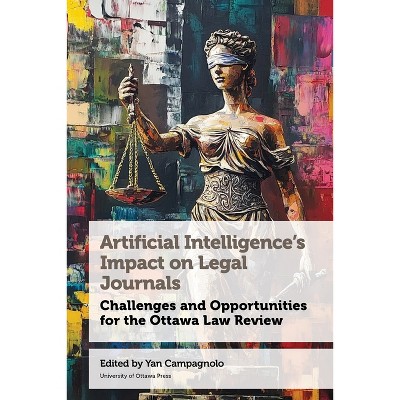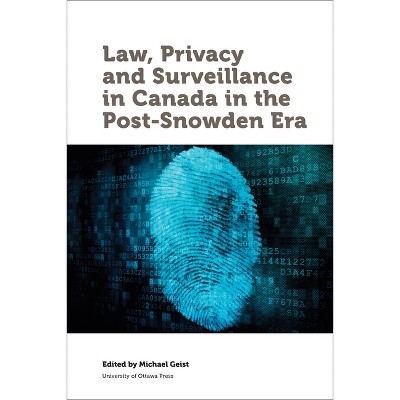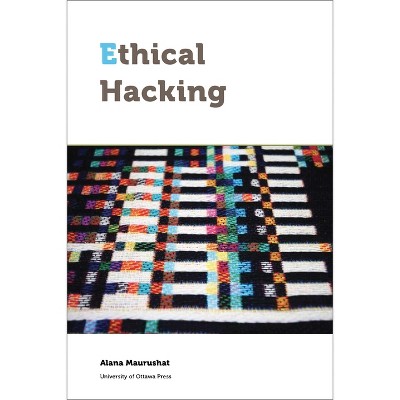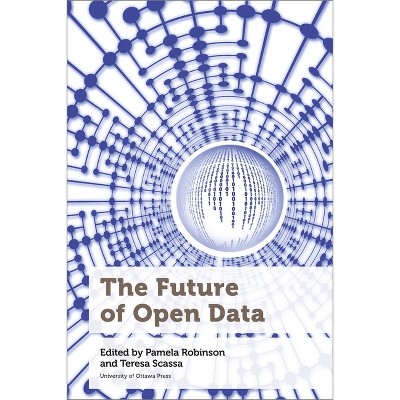Sponsored

The Security of Self - (Law, Technology, and Media) by Emily B Laidlaw & Florian Martin-Bariteau & Michael Geist
Pre-order
Sponsored
About this item
Highlights
- Cybersecurity is a powerful concept often examined through the lens of national security and organizational risks.
- About the Author: Amarnath Amarasingam (Contributor) Amarnath Amarasingam is Assistant Professor in the School of Religion, and is cross-appointed to the Department of Political Studies, at Queen's University.
- 240 Pages
- Freedom + Security / Law Enforcement, Media & the Law
- Series Name: Law, Technology, and Media
Description
About the Book
The Security of Self: A Human-Centric Approach to Cybersecurity redefines what it means to be secure in the digital context--placing people at the centre of cybersecurity. Drawing on multidisciplinary expertise, it offers a nuanced exploration of how policy, law, technology and human behaviour intersect to shape the future of cybersecurity.Book Synopsis
Cybersecurity is a powerful concept often examined through the lens of national security and organizational risks. It however demands a deeper understanding to empower our societies--and ourselves--to thrive in the digital context.
This edited collection explores a new approach to human-centric cybersecurity: the security of self. It invites a paradigm shift where cybersecurity's core purpose is to protect people--and society--from harm, and where empowering individual and collective rights defines what it means to provide a secure cyber environment. With a distinct Canadian focus, and case studies spanning the Internet of Things, artificial intelligence, virtual reality and social media, this collection charts a path forward for cybersecurity, grounded in law, policy and practices that advance the security of self. This collection serves as a valuable resource for researchers, policymakers, regulators and individuals seeking to understand and shape the future of human-centric cybersecurity.About the Author
Amarnath Amarasingam (Contributor)
Amarnath Amarasingam is Assistant Professor in the School of Religion, and is cross-appointed to the Department of Political Studies, at Queen's University. He is also Senior Fellow with the International Centre for the Study of Radicalisation. His research interests are in terrorism, radicalization and extremism, online communities, diaspora politics, post-war reconstruction, and the sociology of religion.
Jane Bailey is Full Professor in Faculty of Law, Common Law Section, at the University of Ottawa where she teaches Cyberfeminism, Technoprudence and Contracts. She co-leads The eQuality Project, a 7-year SSHRC funded partnership grant focused on young people's experiences in digitally-networked environments and is a working group co-leader on The Autonomy through Cyberjustice Technologies Project, a 4-year SSHRC funded partnership grant focused on use of technology to improve access to justice. Her research focuses on TFV, particularly as perpetrated through algorithmic profiling and other practices of technology corporations and governments. She co-edited The Emerald International Handbook on Technology-facilitated Violence and Abuse, an open access publication. Jacquelyn Burkell (Contributor)
Jacquelyn Burkell is a Full Professor in the Faculty of Information and Media Studies at the University of Western Ontario. Her research focuses on the social implications of technology, with particular reference to privacy and equality impacts. She is a co-investigator on two SSHRC Partnership grants focused on the implications of technology: the eQuality Project co-lead by Jane Bailey and Valerie Steeves, and the Autonomy Through Cyberjustice Project, where she co-leads a working group with Jane Bailey. Her research focuses on the social implications of technology, with particular attention to issues of privacy and autonomy. Matthew Bush (Contributor)
Matthew Bush is a master's student at Toronto Metropolitan University studying computer science. He also has a background in business technology management that provides him with a unique perspective to bridge the gap between technology and people. His current research is focused on adjusting state-of-the-art organizational cybersecurity practices to the unique needs of consumer IoT environments. This includes creating access control schemes for smart homes that give individual users more control over their own data. His other research interests include secure and privacy preserving AI, zero trust architecture, and privacy preserving technologies. Pascale-Marie Cantin (Contributor)
Pascale-Marie Cantin holds a Master's degree in Criminology, with a specialisation in forensics and information, from the Université de Montréal, and a Certificate in cyberinvestigation from École Polytechnique. During her studies, she was particularly interested in economic crime and the dynamics between human beings and technology. Having graduated in 2021, she is currently a stock market crime investigator. Benoît Dupont (Contributor)
Benoît Dupont is a Professor of criminology at the Université de Montréal, where he holds the Canada Research Chair in Cyber-resilience and the Endowed Research Chair for the Prevention of Cybercrime. He is the Scientific Director of the Human-Centric Cybersecurity Partnership, an interdisciplinary network of academic, government and industry partners. Sébastien Gambs (Contributor)
Sébastien Gambs is the Canada Research Chair in Privacy and Ethical Analysis of Massive Data and a Professor in the Department of Computer Science at the Université du Québec à Montréal. His main research theme is privacy in the digital world. He is also interested in solving long-term scientific questions such as the existing tensions between massive data analysis and privacy as well as ethical issues
such as fairness, transparency and algorithmic accountability raised by personalized systems. Nick Gertler (Contributor)
Nick Gertler is a master's student in Media Studies at Concordia University. Akim Laniel-Lanani (Contributor)
Akim Laniel-Lanani is Director and Cofounder of the Cybercriminoly Clinic (Clinique de cyber-criminologie), where he is in charge of the everyday activities and the supervision of the student volunteer team. With a bachelor's degree in security and police studies from the School of Criminology at the University of Montreal, he is also a candidate for the Certified Financial Crime Specialist certification. Jordan Loewen-Colón (Contributor)
Jordan Loewen-Colón is the AI, Ethics, and Data Justice Fellow at Queen's University. His research looks at philosophy, religion, and digital technology like virtual reality (VR) and artificial intelligence (AI) to answer questions about what it means to be and feel like a human in the 21st century. Atefeh Mashatan (Contributor)
Atefeh Mashatan is the Canada Research Chair in Quality of Security (QoS) Framework and an Associate Professor at the Ted Rogers School of Information Technology Management and Founder and Director of the Cybersecurity Research Lab at Toronto Metropolitan University
(formerly Ryerson University). Her research is focused on the development of novel cybersecurity designs based on emerging technologies. She investigates challenges and opportunities brought forward by these new technologies and how they change the threat landscape of cybersecurity. Her expertise at the frontlines of the global cybersecurity field was recognized by SC Magazine in 2019, when she was named one of the top five Women of Influence in Security globally. Fenwick McKelvey (Contributor)
Fenwick McKelvey is Associate Professor of Information and Communication Technology Policy in the Department of Communication Studies at Concordia University. He is Co-Director of the Applied AI Institute and leads Machine Agencies at the Milieux Institute. Alex Megelas (Contributor)
Alex Megelas is Manager, Research Innovation and Business Development at the Applied AI Institute at Concordia University. Adam Molnar (Contributor)
Adam Molnar is Assistant Professor of Sociology and Legal Studies and a member of the Cybersecurity and Privacy Institute at the University of Waterloo. His research involves a multidisciplinary approach, using theoretical approaches and methods from social theory, computer science, law, and socio-legal studies. At present he is principal investigator of a multi-year SSHRC funded project on employee monitoring applications and the regulation of workplace surveillance and privacy in Canada. Sharday Mosurinjohn (Contributor)
Sharday Mosurinjohn is Associate Professor of Contemporary Religious Context at Queen's University. She studies the discursive construction of spirituality and religion as well as concepts of nonreligion and secularity; specific interests include the study of "new religious movements" (NRMs), ritual, and religion and/as media. Her broad interest in the material turn touches on contexts of contemporary (especially conceptual) art; museums; everyday aesthetics; digital contexts (eg. social media; surveillance cultures), and affect. Jonathon W. Penney (Contributor)
Jonathon Penney is a legal scholar and social scientist with an expertise at the intersection of law, technology, and human rights. He is an Associate Professor at Osgoode Hall Law School; a Faculty Associate at Harvard's Berkman Klein Center for Internet & Society; and Research Fellow at the Citizen Lab based at the University of Toronto's Munk School of Global Affairs and Public Policy. His work on privacy, security, and technology law and policy has received national and international coverage including in the CBC, Globe and Mail, Washington Post, Reuters, New York Times, WIRED, The Guardian, and Le Monde, among others. Fyscillia Ream (Contributor)
Fyscillia Ream is a Ph.D. candidate in criminology at the University of Montreal. She is also the Scientific Coordinator at the Research Chair in Cybercrime Prevention and a cofounder of the Cyberminology clinic (Clinique de cyber-criminologie). While her dissertation lies at the intersection of organizational deviance and insider threat, she has developed expertise in cybercrime victimization. Teresa Scassa (Contributor)
Teresa Scassa is the Canada Research Chair in Information Law and Policy and a Full Professor in the Faculty of Law, Common Law Section
at the University of Ottawa, where she is a member of the Centre for Law, Technology and Society. Her research addresses digital and data governance issues. She has written widely in the areas of privacy law, data governance, intellectual property law, law and technology, artificial intelligence, and smart cities. She is Co-Editor of the books AI and the Law in Canada (2021), Law and the Sharing Economy (2017), and The Future of Open Data (2022), and Co-Author of Digital Commerce in Canada (2020) and Canadian Intellectual Property Law (2022). Chris Tenove (Contributor)
Chris Tenove is the deputy director of the Centre for the Study of Democratic Institutions (CSDI), and a researcher and instructor in the School of Public Policy & Global Affairs, at the University of British Columbia (UBC). He writes on the challenges that digital media pose to democracy and human rights, focusing on topics such as electoral disinformation, social media regulation, and online harassment of politicians and health communicators. He has published policy reports, book chapters, and peer-reviewed articles in journals including like Political Communication, Political Research Quarterly, and International Journal of Press/Politics. Kristen Thomasen (Contributor)
Kristen Thomasen is an Associate Professor and the Senior Chair of Law, Robotics and Society at the University of Windsor's Faculty of Law. Her research and teaching focus on the regulation of automated technologies, privacy, and tort law. She serves as a member of the RISE Women's Legal Center Board, the LEAF Tech-Facilitated Violence Sub-Committee, and the BC Law Institute Tort Law and AI Committee. She previously served as law clerk to the Honourable Madam Justice Rosalie Abella at the Supreme Court of Canada. Heidi Tworek (Contributor)
Heidi Tworek is the Director of the Centre for the Study of Democratic Institutions and a Canada Research Chair (Tier II) and Associate Professor of Public Policy and History at the University of British Columbia. She has published the award-winning News from Germany: The Competition to Control World Communications, 1900-1945 (Harvard University Press, 2019), and co-edited several volumes. She has published over forty-five journal articles and book chapters as well as many policy reports on the history and policy of communications and media. She is Senior Fellow at the Centre for International Governance Innovation and a non-resident Fellow at the German Marshall Fund of the United States and the Canadian Global Affairs Institute. Emily B. Laidlaw (Editor)
Emily B. Laidlaw is the Canada Research Chair in Cybersecurity Law and an Associate Professor in the Faculty of Law at the University of Calgary. She is also a Senior fellow at the Centre for International Governance Innovation. She researches at the intersection of technology regulation, cybersecurity, human rights and corporate governance. She actively contributes to law reform with recent projects on online harms, mis- and disinformation, defamation law, and intimate image abuse. At present, with funding from the National Cybersecurity Consortium, she co-leads a research project on protecting democracy from cyber threats, and a training grant in cybersecurity law. Florian Martin-Bariteau (Editor)
Florian Martin-Bariteau is the University Research Chair in Technology and Society and an Associate Professor in the Faculty of
Law, Common Law Section at the University of Ottawa, where he is the director of the Centre for Law, Technology and Society. He is co-investigator of the Human-centric Cybersecurity Partnership where he leads the "Transparency and Accountability" stream, and also a Faculty Associate of the Berkman-Klein Center for Internet and Society at Harvard University.

















